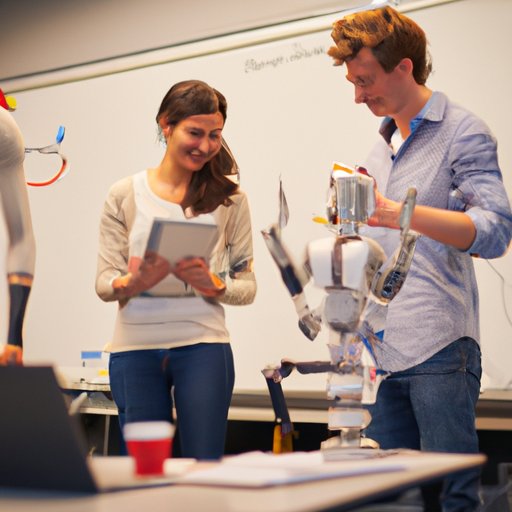Introduction
In recent years, the development of artificial intelligence (AI) and robotics has led to a great deal of conversation about whether or not robots should be programmed with ethical codes. This article will explore this question from a philosophical perspective, examining the potential benefits and risks of programing robots with ethical codes, discussing the possibility of developing a universal code of ethics for robots, and assessing the impact of AI on moral decision-making.
Examining the Philosophical Implications of Teaching Ethics to Robots
There are a number of ethical considerations that must be taken into account when considering the implications of teaching robots ethics. For example, some experts argue that robots should be programmed to act in accordance with certain moral principles, such as non-violence and respect for human life. Others believe that robots should be programmed to make decisions based on their own internal ethical codes, rather than relying on predetermined moral principles.
In addition, there are potential benefits and risks associated with programing robots with ethical codes. On the one hand, programming robots with ethical codes could help to ensure that they behave responsibly and ethically in situations where human safety is at stake. On the other hand, it is possible that programing robots with ethical codes could lead to unintended consequences, such as robots making decisions based on their own ethical principles rather than those of the humans who created them.

Investigating How We Can Incorporate Human Values into Robotic Systems
Creating an ethical framework for robotics is a complex process that involves understanding the complexities of human values and incorporating them into robotic systems. For example, researchers have suggested that robots should be programmed to understand and abide by certain moral principles, such as the Golden Rule, which states that people should treat others as they would like to be treated.
In addition, some experts suggest that robots should be programmed to take into consideration the potential consequences of their actions, as well as the potential harms that could result from their decisions. For example, a robot might be programmed to consider the potential harm that its actions could cause to humans, as well as the potential benefit to society as a whole.
Assessing the Impact of Artificial Intelligence on Moral Decision-Making
The development of AI and robotics has raised a number of questions about the role of humans in shaping robot morality. Some experts argue that robots should be programmed to mimic human behavior, while others suggest that robots should be given autonomy to make their own decisions based on their own internal ethical codes.
In addition, different perspectives on artificial intelligence and ethics have been put forward. For example, some experts argue that robots should be programmed to act in accordance with certain moral principles, while others suggest that robots should be given the freedom to make decisions based on their own ethical codes. Ultimately, the debate over the ethical implications of teaching robots ethics is likely to continue for some time.
Conclusion
This article has examined the philosophical implications of teaching robots ethics, from exploring ethical considerations to assessing the impact of AI on moral decision-making. It is clear that programming robots with ethical codes presents both potential benefits and risks, and that creating an ethical framework for robotics is a complex process that involves understanding the complexities of human values and incorporating them into robotic systems. Finally, different perspectives on artificial intelligence and ethics have been discussed, highlighting the need for further research into this area.
(Note: Is this article not meeting your expectations? Do you have knowledge or insights to share? Unlock new opportunities and expand your reach by joining our authors team. Click Registration to join us and share your expertise with our readers.)
